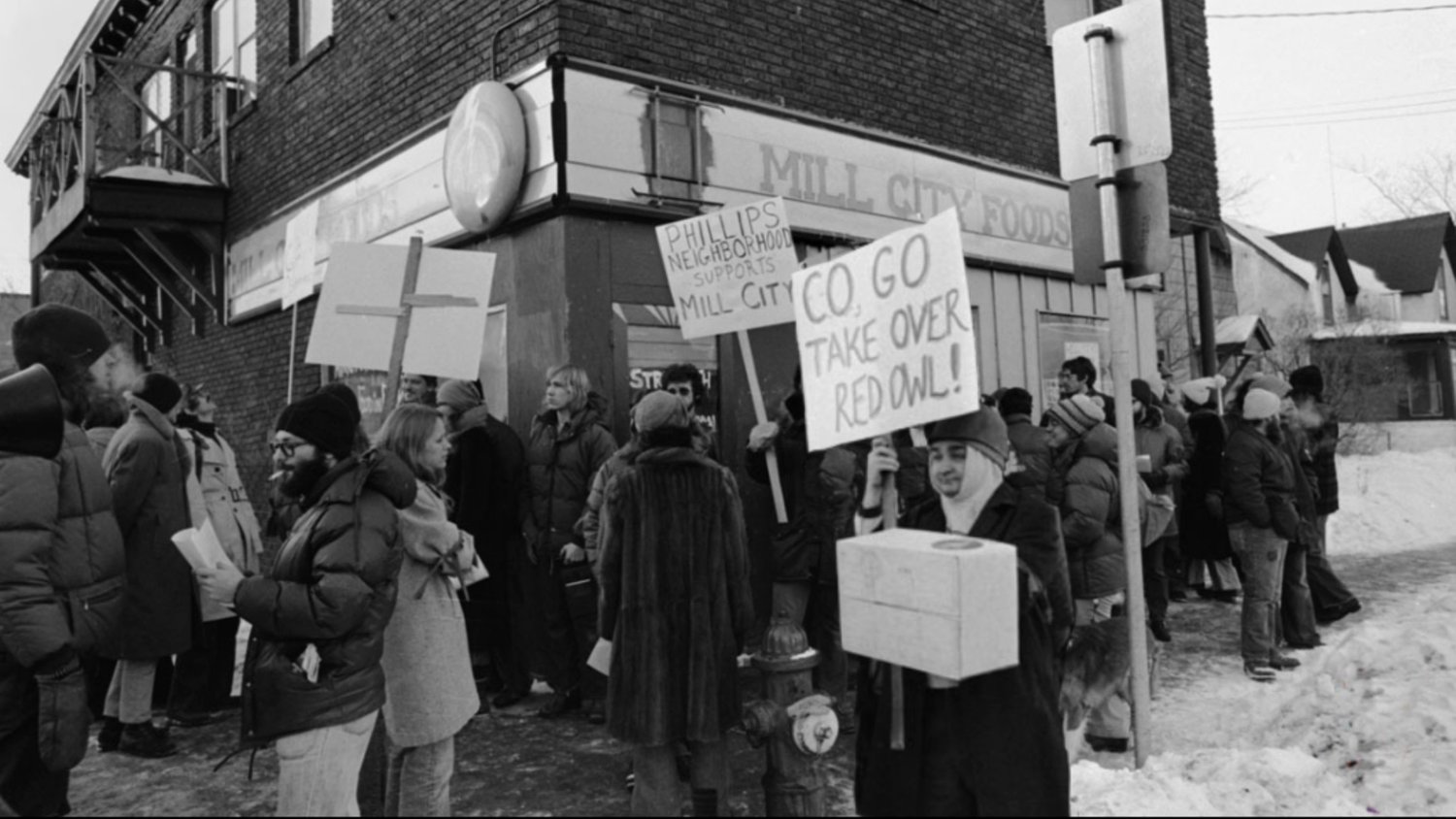When Erik Esse started researching the history of the North Country Co-op in 2006, he hadn’t expected to learn about so many fistfights, steel pipes, and car bombs. Esse was planning a 35th anniversary celebration for the first natural foods co-op in Minneapolis, and he stumbled onto a story of leftists fighting violently for control of the largest regional network of natural food co-ops in the country just as it was developing.
In 2014, Esse teamed with filmmaker Deacon Warner to learn more; their hour-long documentary, The Co-op Wars, premiered at the Minneapolis-St. Paul International Film Festival in March, is available to stream on TPT, and is screening at the Walker Community United Methodist Church tonight. More than an entertaining historical snapshot, the film provides lessons for a new generation of radicals. It’s a cautionary tale of what can happen when sectarian infights spin out of control, and a reality check showing how far natural food co-ops have strayed from their initial goal of societal transformation.
“We take natural food co-ops for granted at this point, especially if you live in Minnesota,” says Esse. “At the time you couldn’t even get whole wheat bread. Broccoli was thought of as a weird thing. It was fascinating to learn about this boom that happened.”
He adds, “The other thing was how odd it was to have a war over co-ops, which are inherently about cooperation.”
In 1974, a revolutionary communist faction, the Co-op Organization (the CO for short), attempted to seize control of the nascent natural food co-op movement by force. They thought their peers lacked the discipline and organization necessary to overthrow capitalism, and foresaw the co-ops developing into an escapist niche detached from the plight of the poor, working-class, and racialized populations they thought should form the base of a revolutionary movement.
The rupture crystallized around what foods the stores should offer and what “community” those foods would attract—put crudely, the choice was tofu or twinkies. The Co-op Wars shows how that food fight reflected a deeper dynamic: the future of the New Left and the counterculture at a historical hinge point, when the generation that marched for civil rights and protested the war in Vietnam came of age and began to splinter.
“Nothing is interesting when it’s merely binaries. This story is so interesting because each side is compelling in different ways,” says Warner. “And there’s a universal nature to the conflict. We seem to be repeating the same mistakes of the co-op wars and so it seems like the right time to be revisiting the lessons.”
It all started on Winding Road Farm, a commune in Georgeville, Minnesota. Suzy Shroyer and Keith Ruona were a young couple inspired by the Diggers, a group that built a utopian society-in-miniature during the heyday of the 1960s counterculture in the Haight-Ashbury neighborhood of San Francisco. After Shroyer and Ruona opened North Country on Riverside Avenue in 1971, a network of co-ops exploded in Minneapolis and St. Paul, far surpassing the scale of the projects in San Francisco that inspired them.
“They were able to see in their own lives the dream of having an alternative economy actually play out, and they could spend much of their money at businesses they were co-owners of,” says Esse.
While these members of the New Left and counterculture that Esse and Warner group together as “the hippies” “turned inward” and embraced communes, organic farming, and alternative institutions like co-ops, some of their contemporaries were drawn toward the Third World national liberation movements putting Mao, Marx and Lenin into practice.
This is where a man by the alias of Theophilius Smith, a.k.a. “Smitty” enters. A charismatic Black communist with experience in the Student Nonviolent Coordinating Committee, Smith advised Ruona and another Winding Road member named Bob Haugen to reform the the co-ops into “a weapon in the struggle against the monopolistic profit structure of the food industry.” And thus the CO was born, gaining a foothold amongst the co-op rank and file.
“It’s telling that The CO became very popular among the core co-op people, especially those who worked in the stores. They fulfilled the desire people had to be serious, to be theoretical and to be disciplined,” said Esse.
The CO allied with former Black Panther Moe Burton to open the Bryant-Central Co-op in the historically black section of south Minneapolis. Minneapolis viewers might recognize Burton’s nephew, Gary Cunningham, a nonprofit executive and husband to former Minneapolis mayor Betsy Hodges. A young Cunningham features prominently in the film’s climax: a 1975 showdown at the co-op distribution center called the People’s Warehouse. Armed with steel pipes, the CO takes control of the distribution center. “It’s time for some Third World Leadership,” Cunningham recalls telling his adversaries.
The warehouse takeover led to a series of escalating violent confrontations, and a flame war through their respective newspapers that will ring familiar to anyone who has observed lefitsts fight on Twitter. In the process the CO ended up alienating their two most important allies –– Burton and then-city council member Ed Felien, who called their tactics “gangster Marxism.” By 1976, the war was over. A court order returned control of the warehouse to the hippies. The CO retained a few outposts around the city but eventually faded into a secretive and abusive cult known as “the O.”
In their attempt to “heighten the contradictions,” the CO misassessed where their base actually was. As the historian Max Elbaum puts it, many New Communist groups in the ’70s and’ 80s had “an exaggerated evaluation of their potential.” The CO member and future Minneapolis city councilmember Dean Zimmerman wrote in an exit manifesto that “the primary result of the CO’s work has been to create anti-communism.”
Unfortunately for both sides, the conflict accelerated an apolitical turn in natural food co-ops. “It was seen as so divisive and alienating. People were scared of touching politics because they remembered this traumatic event and they didn’t think any good can come of it,” says Esse.
As a result, buying organic and natural food offered nothing more than consumerism as a substitute for political action. In hindsight one might say that the hippies won the war, but the CO won the argument. The most prominent symbol of eating organic today is Whole Foods, founded by a union-busting “conscious capitalist,” who then sold it to Jeff Bezos, the most prominent symbol of monopoly capitalism since the Gilded Age.
In the film, journalist Craig Cox admits that “the CO, in a way, was right.” Co-ops became a niche market for the college-educated, white liberal tote-bag set. Yet Cox maintains that the fact they exist at all is a “miracle.”
This ambivalence runs through Warner and Esse’s closing act, a depiction of the struggle over the Seward Co-op Friendship Store, when Black residents in the south Minneapolis neighborhood pushed back on the development as a harbinger of gentrification. Though initially resistant to concessions, eventually the co-op and the community come to an agreement. This is Esse and Warner’s attempt to thread the needle between the opposing sides in the co-op wars, but it feels unsatisfying, especially when compared to the liberatory vision of the beginning of the film.
“As we’re screening this film with cooperatives around the country, a lot of them are asking how do we differentiate ourselves? If they can’t do it with the products anymore, it’s pushing them to reestablish that there is some progressive ideology there as well,” says Warner. “Which in some ways shows that the CO’s time has come around again.”
If you identify with the CO, the film is a consideration that not every tactic that can be justified on moral or ideological grounds is necessarily sound movement-building strategy. If you identify more with the hippies, the enduring relevance of the CO’s critique of the class and racial profile of natural foods co-ops should provoke sober reflection.
““This film is unusual in activist filmmaking in that it’s not celebrating a hero or demonizing a villain,” says Esse. What I hope it can do is help people develop wisdom and humility when they’re doing activism, so they’re not saying ‘I was right all along. But that I have to learn and listen as I try to change the world.’”
The Co-op Wars
With: Post-screening discussion with director Deacon Warner and participants Dean Zimmerman and Dave Gutknecht.
Where: Walker Community United Methodist Church
When: 7 p.m. Friday, Dec. 3
Tickets: Donations accepted. More info and RSVP here.






